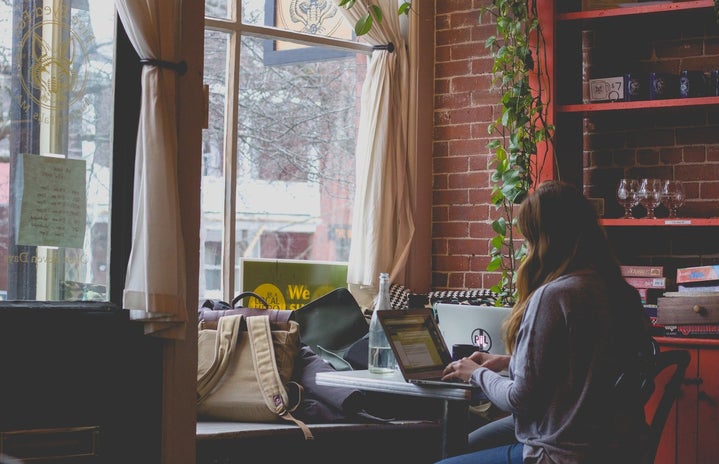Waking up early on a cold, dark morning isn’t exactly anyone’s idea of a good time. The rain is endless, and your bed seems like the comfiest place in the world. Everyone feels like this as winter comes and the nights draw in, however, this can sometimes be a little more than it first seems.
The ‘Winter Blues’ is the common name used to refer to Seasonal Affective Disorder, SAD for short, which is a form of depression that comes and goes in a seasonal pattern. Although it is often referred to as the ‘winter blues’, SAD can affect anyone at any time of year.
I have lived with SAD for a long time now, however, unlike most who experience symptoms in the winter months, I feel its effects in early spring.
Symptoms are often more acute in autumn and winter because the days are getting shorter and so, we get less light. When it is light outside, the body stops producing melatonin, a sleep hormone. This means that when it is darker outside, the body produces more melatonin, which can cause fatigue and low energy.
SAD presents itself differently from person to person, so nobody with SAD will have the same experience, however there are some common symptoms:
- Lack of energy
- Difficulty concentrating
- Self-isolation
- Sleep problems, such as sleeping more or less than usual, difficulty falling asleep or staying awake
- Changes in appetite
- Being more prone to illnesses
- Suicidal feelings
It is important to note that this is not an exclusive list though and that you may have none of these symptoms but still feel the effects of Seasonal Affective Disorder. My best advice is to trust your gut – if you feel like you may be facing some mental health challenges (whether that is SAD or something else) then you should seek support and visit your doctor, there is no ‘one-size-fits-all’ when it comes to mental health.
For me, when I am in the depths of an episode of SAD, I often find that I have trouble getting to sleep and can spend hours ruminating over tiny things that have happened during the day or in the past. It is also difficult for me to think straight and I often describe it as my brain feeling like some tangled headphones – I just have no clue where to start untangling them… so, I don’t even try.
We’ve all seen the news about the impending mental health crisis we’re facing as a result of coronavirus, and I fear that the winter ahead may make this prediction a reality. SAD sufferers may face symptoms much worse than usual this year as a result of the second lockdown which will stop them being getting out into the daylight and to socialise.
People who haven’t suffered from SAD before may also, unfortunately, see SAD impacting their day-to-day life too. Working from home and fewer opportunities for socialising may exacerbate the feelings of isolation many identify as a symptom of their Seasonal Affective Disorder.
With this in mine, it’s important to think of ways to help yourself if and when you start to feel that you may not be in the best place with your mental health.
The first thing I would recommend is to take some time to sit and identify exactly what you are feeling, and where in your body you feel it. You can take as little or as long as you like on this but, this has helped me come to terms with my feelings and normalise them, as well as helping to deal with SAD by targeting the symptoms.
As mentioned above, it is also a good idea to try and get outside into some natural daylight too. This helps to combat those feelings of drowsiness and sluggishness you may feel. This will, undoubtedly, be more difficult this year as we face so many restrictions that seem to be changing daily. Even just opening the curtains and letting in some light while you sit at your desk will have an impact.
Talking is one of the hardest things to do when we’re going through a tough time, but for me it has been one of the most effective ways of fighting SAD. I found it very difficult for such a long time to open up about what I was going through, but I found that as I did it encouraged others to as well. We’ll all have to help each other through the challenges we face over the coming months, so even talking to one person may help them as much as it helps you.
Speaking to a doctor is imperative if you feel like you may have symptoms of SAD. This, again, is a such difficult thing to do but, your doctor is the person who knows the best ways to deal with SAD. Whether that be light therapy, cognitive behavioural therapy (CBT) or antidepressants, they’ll be able to tailor any help so that it is most effective for you.
Finally, give yourself time. Although in 2020 life has slowed down to a fraction of what it has been in recent times, it’s important to realise that some days you just need time to “untangle”. You’re allowed to feel everything you are feeling right now, and you’re allowed to ask for a minute if you’re finding it all a bit too much. Remember, we’re in an unprecedented situation and no one really has a clue what is going on… even if you think everyone else appears to be the master of pandemic perfection.
So remember, be kind to yourself, be kind to others, and most of all, take each day as it comes.
Below are some resources to help you if you are struggling or need someone to talk to:
- Mind UK – great for any information surrounding mental health, whether that be SAD or something else. You can also contact them directly from their website if you feel you are struggling.
- SHOUT – a text helpline specifically for mental health. Just text 85258 to be connected to a volunteer who will help you navigate through your feelings, or just sit and chat until you feel better.
- Leeds Nightline – available between 8pm and 2am for any Leeds-based students. They offer instant messaging and email services currently.
- Samaritans – available 24/7 to anybody on the phone number 116132.
Words By: Alice Mason
Edited By: Laura Murphy



